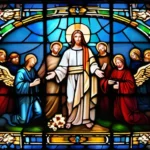Explore the process, reasons, and implications of deconstructing Christianity in this detailed guide.
This article delves into the concept of deconstructing Christianity, discussing its definition, reasons, and implications. We’ll explore various aspects such as historical context, philosophical perspectives, and personal experiences to provide a well-rounded understanding.
The Historical Context of Deconstruction
The journey into deconstructing Christianity begins at the crossroads of history, where traditional narratives meet the challenges posed by changing times and evolving thought processes. How did this process start? The roots of deconstruction can be traced back to the late 19th century, but it truly began to take shape in the early 20th century with thinkers like Friedrich Nietzsche and Martin Heidegger. These philosophers questioned the foundations of religious faith, challenging us to uncover hidden biases and assumptions within our beliefs.
The seeds of deconstruction were further nurtured by the postmodern era, especially through the works of Jacques Derrida. Derrida’s philosophy introduced the idea that texts are not fixed but are constructed through various interpretations. This metaphor of text as a puzzle became central to understanding how Christianity and other religious doctrines can be deconstructed. It invites us to see sacred writings, such as the Bible, not just as divine revelation, but also as human constructs influenced by cultural, social, and historical contexts.
The deconstruction of Christianity is more than a mere academic exercise; it’s a profound reflection on the nature of faith itself. Is religion an immutable truth or a malleable interpretation? This question has echoed through time, prompting countless individuals to re-evaluate their beliefs and the ways in which they are passed down through generations.
The implications of deconstructing Christianity are wide-ranging, touching on personal identity, community values, and ethical frameworks. As we delve into these questions, it becomes clear that the process is not about rejecting religion outright but rather about understanding its complexities more deeply. In this sense, deconstruction can be seen as a journey towards a more nuanced and inclusive interpretation of faith, one that acknowledges the diversity of human experience and the ever-evolving nature of truth.
Philosophical Perspectives on Deconstruction
When we delve into the philosophical perspectives on deconstruction, it’s like stepping into a labyrinth where truth and meaning intertwine in a complex dance. One of the most influential theories is postmodernism, which challenges us to question the very foundations upon which traditional beliefs are built. How can something as fundamental as Christianity be dismantled through philosophy?
Postmodernism, with its emphasis on relativism and the fragmentation of grand narratives, invites us to see Christianity not as a singular, unchangeable truth but as a collection of stories and perspectives that shift and evolve over time. This is like looking at a mountain from different angles; each view offers new insights, yet none capture the whole essence.
Existentialism also plays a crucial role in this deconstruction process. It forces us to confront the reality that our lives are not pre-determined or controlled by external forces. ‘Is God’s will guiding my every step?’ asks existential thought, pushing us to explore the autonomy of human existence.
In both philosophies, the idea of a fixed, absolute truth becomes questionable. Christianity, with its rich tapestry of doctrines and practices, starts to appear more as a series of interpretive lenses that we use to understand the world around us. This is akin to choosing different color filters on a photo; each one reveals aspects of reality but none can claim to show the whole picture.
By exploring these philosophical perspectives, we uncover layers of complexity and nuance in our understanding of Christianity. It’s not just about rejecting or accepting beliefs outright but engaging with them in a deeper, more critical manner. This process of deconstruction is like peeling back the layers of an onion—each layer reveals something new, yet leaves us wanting to know more.
In essence, philosophical deconstruction invites us to live in a state of perpetual inquiry and reflection, where our beliefs are constantly being challenged and reshaped by the dynamic nature of thought and experience. It’s a journey that requires openness, curiosity, and a willingness to question everything, even what we hold most dear.
Personal Experiences with Deconstruction
Imagine stepping into a labyrinth, where every path seems to lead you back to questions that challenge your faith. For many individuals who have embarked on the journey of deconstructing Christianity, it’s akin to wandering through this metaphorical maze. One such person is Sarah, who found herself in this complex and often disorienting space after years of deep religious conviction.
Why did Sarah start questioning her faith? It wasn’t a sudden epiphany but rather an accumulation of small realizations over time. She began to notice inconsistencies within the Christian teachings she had grown up with, which didn’t align with modern scientific understanding or personal experiences. Was it possible that centuries-old interpretations were merely constructs, not inherently true? These thoughts started to unravel her lifelong beliefs, leaving her in a state of uncertainty and introspection.
Another individual, Mark, shared his experience of deconstructing Christianity through the lens of postmodernism. He found solace in the idea that truth is not absolute but relative, influenced by context and perspective. This shift allowed him to explore Christianity without the burden of rigid dogmas, leading him to a more nuanced understanding. Yet, this process wasn’t always smooth; it involved grappling with feelings of isolation from his community and questioning the very core of what he thought he believed.
These personal experiences highlight the deeply individual nature of deconstructing Christianity. For some, like Sarah, it’s about reconciling faith with rationality, while for others, like Mark, it’s a quest for authenticity that often involves breaking away from traditional beliefs. Both journeys are marked by a profound sense of questioning and re-evaluation, transforming their understanding of the world and their place in it.
The deconstruction of Christianity, therefore, is not just an intellectual exercise but a deeply personal voyage filled with discovery, doubt, and eventual acceptance of uncertainty. It challenges us to look beyond surface-level beliefs and delve into the complexities of faith and reason.
The Implications of Deconstruction
The implications of deconstructing Christianity are like ripples in a pond, spreading out and affecting everything around them. How does this process impact your identity? Are you just floating along, unsure of where these new waters will take you?
On one hand, deconstruction can be liberating, much like shedding old clothes that no longer fit. It allows you to redefine yourself beyond the confines of a single religious framework. But what does this mean for your sense of self? Do you feel more free or lost in this newfound space?
- Identity: Do you find that deconstructing Christianity has changed how you see yourself and your place in the world?
- Community: How does the loss of a traditional Christian community affect your social interactions and support systems?
- Spirituality:
Is spirituality something you hold onto even after deconstructing Christianity? What new ways do you find to explore and express this aspect of yourself?
The impact on community can be particularly poignant. It’s like losing a long-standing family, but not having another one ready to replace it. You might feel isolated or disconnected from those who still believe in the traditional framework. How do you navigate these feelings? Are there new communities emerging that resonate with your deconstructed worldview?
Moreover, spirituality post-deconstruction can take many forms. Some find solace in nature, while others in art, or philosophy. The question is: how does your spiritual practice evolve when it’s no longer tied to the Christian narrative?
In conclusion, deconstructing Christianity is a profound journey that reshapes not only one’s religious beliefs but also personal identity and community ties. It challenges you to redefine yourself in ways that might be uncomfortable at first but ultimately can lead to a richer understanding of who you are.
Navigating Your Own Journey of Deconstruction
Navigating Your Own Journey of Deconstruction: A Comprehensive Guide
Are you feeling lost, as if your faith has been turned upside down? If so, you’re not alone. Many find themselves questioning their beliefs in a process known as deconstruction. This isn’t about giving up on Christianity entirely; rather, it’s about critically examining the core tenets and understanding how they align with personal experiences and contemporary knowledge.
Begin by journaling your thoughts. Write down your doubts, questions, and even fears. Reflecting in writing can help clarify your feelings and pinpoint areas where you need more exploration. Think of it as a map to navigate the terrain of your beliefs.
Engage with diverse viewpoints. Read books by both traditionalists and those who have deconstructed Christianity. Attend talks or watch videos featuring different perspectives. It’s like visiting various landscapes; each view offers something unique, challenging you to see things from multiple angles.
Challenge yourself to consider evidence critically. Ask tough questions: Is the Bible a literal historical document, or is it more metaphorical? How do your personal experiences compare with religious teachings? Be open to the idea that some parts of Christianity might align better than others, and that’s okay.
Join groups where you can share and discuss your journey. Whether online forums or local meetups, being part of a community can provide support and validation. It’s like traveling in a group; you get to learn from each other’s experiences and insights.
Remember, deconstructing Christianity is not about arriving at one definitive answer but rather engaging with the complexity of faith. Each step of your journey will reveal more questions than answers, pushing you to grow intellectually and spiritually.
What do you think you’ll discover as you navigate this path?
The Future of Christianity in Light of Deconstruction
As we delve into the future of Christianity in light of deconstruction, let’s ponder the vast landscape that lies ahead. Could this process lead to a fragmented faith, where diverse beliefs coexist without uniformity? Or might it give birth to a more inclusive and adaptive religion that resonates with modern values?
One potential scenario is the emergence of micro-communities within Christianity. These groups could form around shared interests or principles, creating a tapestry of belief systems rather than a single cohesive tradition. Imagine a church where members gather not just for Sunday services but also for discussions on ethics, environmental issues, or social justice. Would this diversification enrich our understanding of the faith, or dilute its core doctrines?
Another fascinating possibility is the development of interfaith dialogues and collaborations. As Christians begin to question traditional beliefs, they might seek common ground with other religions. Could such interactions lead to a new form of spiritual pluralism where people from different backgrounds learn from each other’s wisdom? This could be seen as a bridge towards a more interconnected world where religious boundaries blur.
On the downside, deconstruction might also result in disillusionment and loss of community identity. As believers question long-held beliefs, they may find themselves adrift without clear direction or support. How can churches adapt to this shift? Perhaps by fostering an environment where doubt is welcomed as part of a spiritual journey.
The future of Christianity hinges on our willingness to embrace change. Will we see it as a threat to tradition, or as an opportunity for growth and renewal? The deconstruction process has shown that faith can be both fragile and resilient. As we navigate this evolving landscape, let us keep in mind the words of T.S. Eliot: ‘We shall not cease from exploration, and the end of all our exploring will be to arrive where we started, and know the place for the first time.’ May our journey through deconstruction lead us back to a deeper understanding of our faith.
In conclusion, while the future is uncertain, it offers both challenges and possibilities. The deconstruction process has opened up new avenues for reflection and dialogue, inviting Christians to reshape their beliefs in light of contemporary questions. As we move forward, let us approach this transformation with openness and curiosity, ready to embrace the unknown.
Will you be part of this transformative journey? The path is yours to choose.
Conclusion
 By the end of this guide, you will have gained insights into the process of deconstructing Christianity and its impact on individuals and society. You will also be equipped with tools to navigate your own journey of questioning and redefining your faith.
By the end of this guide, you will have gained insights into the process of deconstructing Christianity and its impact on individuals and society. You will also be equipped with tools to navigate your own journey of questioning and redefining your faith.











